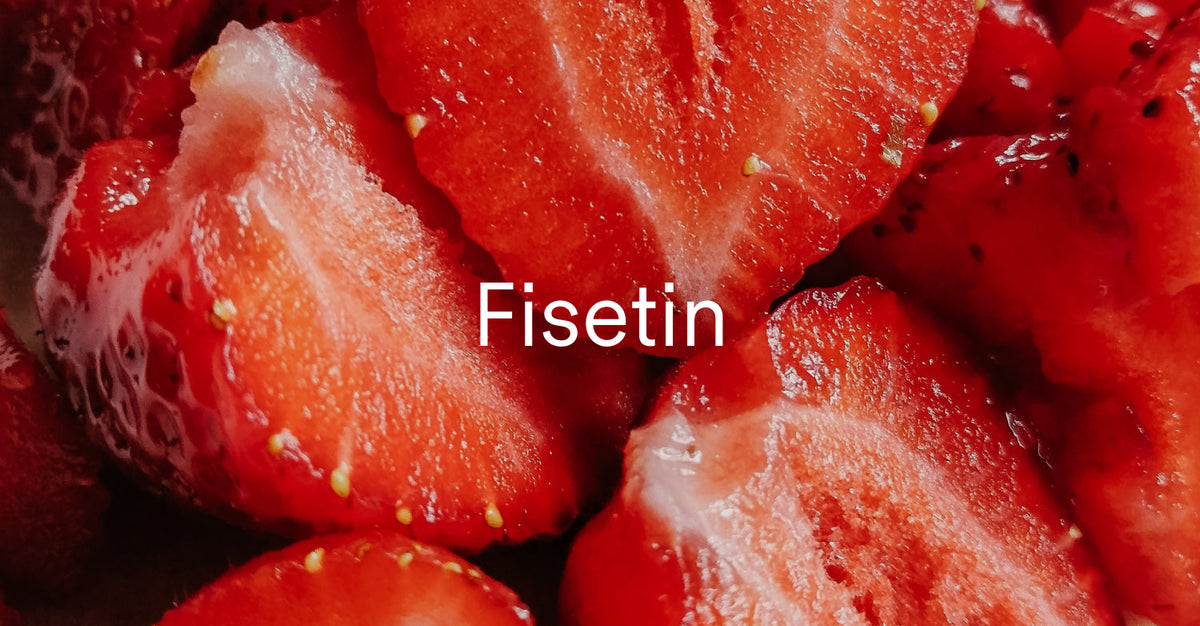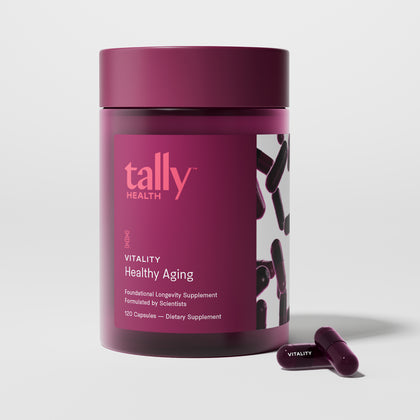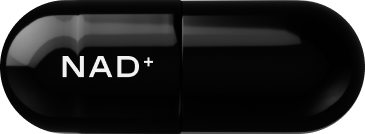

When it comes to promoting healthy aging, some compounds stand out from the crowd—and fisetin is one of them. Found in strawberries, apples, onions, and cucumbers, fisetin is a natural compound with antioxidant properties. It belongs to a class of polyphenols known as flavonoids, specifically referred to as the dietary flavonoid fisetin. But fisetin is more than just a dietary antioxidant.
In the last decade, scientists have uncovered experimental evidence that fisetin may play a unique role in slowing aging by clearing senescent cells, protecting against neurodegeneration, and reducing inflammation. These discoveries place fisetin at the forefront of research into senotherapeutics —compounds that target the cellular drivers of aging.
Let’s explore the science behind fisetin benefits and why this emerging bioactive is a featured ingredient in Vitality by Tally Health, our flagship formula designed to support healthy aging.
What Is Fisetin?

Fisetin is a naturally occurring flavonoid that has been studied for its antioxidant, anti-inflammatory, anti-cancer, and neuroprotective properties. While it’s found in many common fruits and vegetables, dietary intake is typically low—less than 0.4 mg per day in Western diets.
In animal and cell studies, fisetin has shown a remarkable ability to reduce markers of cellular senescence—cells that no longer divide and secrete harmful inflammatory molecules. Cell culture studies and research using human cell lines have been instrumental in uncovering fisetin's effects, particularly its impact on cancer cells and biological pathways. Animal studies serve as a foundation for our understanding of fisetin's biological activities and ability to target senescent cells. These so-called “zombie cells” accumulate with age and contribute to multiple chronic diseases.
Wellness Benefits and Positive Effects of Fisetin
Supplementing or focusing on fistein-rich foods (such as strawberries, red apples, and persimmons) are a great way to capture the health benefits of fisetin. Beneficial effects of fisetin include: preventing cellular senescence, cancer prevention, and improved skin health.
1. Cellular Senescence: Fisetin as a Natural Senolytic
One of the most exciting fisetin benefits is its ability to act as a senolytic —a compound that selectively removes senescent cells from the body. Fisetin acts by destroying senescent cells, which helps to promote longevity by reducing the burden of these aging cells. Senescent cells are a hallmark of aging, implicated in conditions ranging from osteoarthritis to cardiovascular disease and frailty.
In a landmark study, fisetin treatment significantly reduced senescent cell burden in aged mice, improved tissue function, and extended both median and maximum lifespan—even when administered later in life. These findings have sparked a surge of interest in fisetin as a potential anti-aging therapeutic.
🧪 Fisetin is now being tested in multiple human clinical trials for its senolytic properties, including studies in osteoarthritis and frailty in older adults.
2. Brain Health and Neuroprotection
Fisetin also exerts protective effects in the brain. It crosses the blood-brain barrier and has demonstrated antioxidant, anti-inflammatory, and neurotrophic effects in animal models of Alzheimer’s, Parkinson’s, and other neurodegenerative diseases, as well as stroke.
In rodents, fisetin improves memory, reduces amyloid plaque formation, and enhances long-term potentiation—a process essential for learning and memory. It also supports mitochondrial function and reduces neuroinflammation, both of which are central to age-related cognitive decline.
3. Inflammation and Immune Modulation
Aging is associated with inflammaging —a chronic, low-grade inflammatory state that drives many age-related diseases. Fisetin helps curb this process by modulating pro-inflammatory cytokines like TNF-α, IL-6, and IL-1β and inhibiting nuclear factor kappa B (NF-κB), a master regulator of inflammation.
It also influences immune cell function, helping to shift the immune system away from an overactive, inflammatory state toward a more balanced and effective defense system—something that becomes increasingly important with age. Additionally, fisetin may affect mast cells, which are involved in inflammation, immune responses, and can contribute to the tumor microenvironment.
4. Oxidative Stress and Antioxidant Protection
Fisetin is a potent scavenger of free radicals, specifically reactive oxygen species (ROS), and supports the activity of endogenous antioxidant enzymes like superoxide dismutase (SOD), catalase, and glutathione peroxidase. Fisetin helps prevent the decreased expression of these antioxidant enzymes, thereby enhancing cellular defense mechanisms. These enzymes are essential for protecting cells and mitochondria from oxidative damage, a major contributor to cellular aging and chronic disease. Additionally, fisetin's antioxidant effects support healthy cellular metabolism by protecting mitochondria from oxidative damage.
5. Metabolic and Cardiovascular Support
Emerging studies show that fisetin may improve insulin sensitivity, reduce triglycerides, and protect blood vessels by reducing oxidative stress and inflammation in endothelial cells. These effects may help reduce the risk of metabolic syndrome and cardiovascular disease—two of the biggest threats to healthspan.

Fisetin-Rich Foods (and Why You Still Might Want to Supplement)
Fisetin is a naturally occurring flavonoid found in a variety of fruits and vegetables. The foods richest in fisetin include:
Strawberries (the highest known source)
Apples
Persimmons
Onions
Grapes
Cucumbers
Kiwis
While these are all healthy, antioxidant-rich choices, here’s the catch: you’d have to eat pounds of strawberries or dozens of apples per day to reach the fisetin levels used in most scientific studies that report senolytic or cognitive benefits.
That’s why fisetin supplements have gained interest: they provide a concentrated dose that would be very difficult to get through diet alone—without the added sugar or calories. For those looking to support cellular health, supplementing with clinically studied amounts of fisetin offers a more effective approach.

Considering a Fisetin Supplement?

While fisetin is found in certain fruits and vegetables, the therapeutic doses used in clinical and preclinical studies are much higher than can be obtained from diet alone.
That’s why Vitality by Tally Health includes a clinically studied dose of fisetin, paired with other science-backed ingredients that support healthy aging by targeting multiple cellular pathways.
Final Thoughts
Fisetin is a standout compound in the world of cellular health. As a natural senolytic, neuroprotective, anti-inflammatory, and antioxidant agent, it offers a multifaceted approach to supporting healthy aging. Research suggests that fisetin can target established hallmarks of aging, such as cellular senescence. While research is ongoing, early results are promising—and incorporating fisetin into your longevity routine may help you stay healthier for longer.
What is fisetin?
Fisetin is a naturally occurring flavonoid that has been studied for its antioxidant, anti-inflammatory, anti-cancer, and neuroprotective properties. It’s found in many fruits and vegetables, but dietary intake is typically less than 0.4 mg per day in Western diets.
What is one of the most exciting benefits of fisetin?
One of the most exciting fisetin benefits is its ability to act as a senolytic—a compound that selectively removes senescent cells from the body, helping promote longevity by reducing the burden of these aging cells.
Why might someone take a fisetin supplement instead of relying on food sources?
The therapeutic doses used in scientific studies are much higher than what can be obtained from diet alone—you’d need to eat pounds of strawberries or dozens of apples daily—making supplementation a more effective approach.
Recommended Supplements
Citations
López‑Otín, C., Blasco, M. A., Partridge, L., Serrano, M., & Kroemer, G. (2013). The hallmarks of aging. Cell, 153(6), 1194–1217. https://doi.org/10.1016/j.cell.2013.05.039
Childs, B. G., Durik, M., Baker, D. J., & van Deursen, J. M. (2015). Cellular senescence in aging and age-related disease: From mechanisms to therapy. Nature Medicine, 21(12), 1424–1435. https://doi.org/10.1038/nm.4000
Yousefzadeh, M. J., Zhu, Y., McGowan, S. J., Angelini, L., Fuhrmann-Stroissnigg, H., Xu, M., ... & Niedernhofer, L. J. (2018). Fisetin is a senotherapeutic that extends health and lifespan. EBioMedicine, 36, 18–28. https://doi.org/10.1016/j.ebiom.2018.09.015
Khan, N., Syed, D. N., Ahmad, N., & Mukhtar, H. (2013). Fisetin: A dietary antioxidant for health promotion. Antioxidants & Redox Signaling, 19(2), 151–162. https://doi.org/10.1089/ars.2012.4901
Khan, H., Sureda, A., Belwal, T., Czaja, M., Nabavi, S. M., & Tejada, S. (2018). Polyphenols in the treatment of autoimmune diseases. Autoimmunity Reviews, 18(3), 247–257. https://doi.org/10.1016/j.autrev.2019.05.001
Maher, P. (2015). How fisetin reduces the impact of age and disease on CNS function. Frontiers in Bioscience, 7, 58–77.https://doi.org/10.2741/s425











